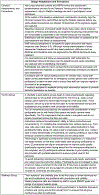Study protocol for a revised randomized trial: Remotely delivered Tai Chi and wellness for Gulf War illness
- PMID: 36494045
- PMCID: PMC9918688
- DOI: 10.1016/j.cct.2022.107045
Study protocol for a revised randomized trial: Remotely delivered Tai Chi and wellness for Gulf War illness
Abstract
Background: Many of the 700,000 American military personnel deployed to the Persian Gulf region in 1990 and 1991 have since reported health symptoms of unknown etiology. This cluster of symptoms has been labeled Gulf War Illness and include chronic musculoskeletal pain, fatigue, headaches, memory and attention difficulties, gastrointestinal complaints, skin abnormalities, breathing problems, and mood and sleep problems [1,2]. There have been few high-quality intervention trials and no strong evidence to support available treatments [3]. Tai Chi is an ancient Chinese martial art with benefits that include enhancing physical and mental health and improving quality of life for those with chronic conditions.
Proposed methods: In this randomized controlled trial, GW Veterans are randomly assigned to either Tai Chi or a Wellness control condition, with both remotely delivered intervention groups meeting twice a week for 12 weeks. The primary aim is to examine if Tai Chi is associated with greater improvements in GWI symptoms in Veterans with GWI compared to a Wellness intervention. Participants will receive assessments at baseline, 12 weeks (post-intervention), and follow-up assessments 3- and 9-months post-intervention. The primary outcome measure is the Brief Pain Inventory that examines pain intensity and pain interference.
Conclusion: This trial will produce valuable results that can have a meaningful impact on healthcare practices for GWI. If proven as a helpful treatment for individuals with GWI, it would support the implementation of remotely delivered Tai Chi classes that Veterans can access from their own homes.
Keywords: Complementary; Gulf war illness; Integrative; Tai chi; Veteran; Wellness.
Published by Elsevier Inc.
Conflict of interest statement
Declaration of Competing Interest The authors declare that they have no known competing financial interests or personal relationships that could have appeared to influence the work reported in this paper.
Figures
Similar articles
-
Tai Chi and Wellness Interventions for Veterans with Gulf War Illness: A Randomized Controlled Feasibility Trial.Int J Behav Med. 2024 Dec 16:10.1007/s12529-024-10338-7. doi: 10.1007/s12529-024-10338-7. Online ahead of print. Int J Behav Med. 2024. PMID: 39681780
-
Protocol for remote Tai Chi and wellness for PTSD and pain in veterans.Eur J Psychotraumatol. 2024;15(1):2411140. doi: 10.1080/20008066.2024.2411140. Epub 2024 Oct 28. Eur J Psychotraumatol. 2024. PMID: 39466656 Free PMC article.
-
Physical Activity and Functioning Following Tai Chi and a Wellness Comparison Intervention in Veterans with Gulf War Illness.Behav Med. 2025 Jun 5:1-11. doi: 10.1080/08964289.2025.2508971. Online ahead of print. Behav Med. 2025. PMID: 40470637
-
The Effects of Tai Chi Mind-Body Approach on the Mechanisms of Gulf War Illness: an Umbrella Review.Integr Med Res. 2019 Sep;8(3):167-172. doi: 10.1016/j.imr.2019.05.003. Epub 2019 May 30. Integr Med Res. 2019. PMID: 31304089 Free PMC article. Review.
-
Progression of intervention-focused research for Gulf War illness.Mil Med Res. 2019 Oct 18;6(1):31. doi: 10.1186/s40779-019-0221-x. Mil Med Res. 2019. PMID: 31627737 Free PMC article. Review.
Cited by
-
Tai Chi and Wellness Interventions for Veterans with Gulf War Illness: A Randomized Controlled Feasibility Trial.Int J Behav Med. 2024 Dec 16:10.1007/s12529-024-10338-7. doi: 10.1007/s12529-024-10338-7. Online ahead of print. Int J Behav Med. 2024. PMID: 39681780
-
Protocol for remote Tai Chi and wellness for PTSD and pain in veterans.Eur J Psychotraumatol. 2024;15(1):2411140. doi: 10.1080/20008066.2024.2411140. Epub 2024 Oct 28. Eur J Psychotraumatol. 2024. PMID: 39466656 Free PMC article.
-
Exploring the Feasibility and Acceptability of Telehealth Qi Gong Shared Medical Appointments: A Novel Approach to Expand Access.Glob Adv Integr Med Health. 2024 Sep 11;13:27536130241283789. doi: 10.1177/27536130241283789. eCollection 2024 Jan-Dec. Glob Adv Integr Med Health. 2024. PMID: 39291235 Free PMC article.
-
Specific, Measurable, Action-Oriented, Realistic, and Timed Goals and the Personal Health Inventory in a Wellness Group for Veterans With GWI.Med Care. 2024 Dec 1;62(12 Suppl 1):S65-S72. doi: 10.1097/MLR.0000000000002044. Epub 2024 Sep 3. Med Care. 2024. PMID: 39514497 Free PMC article. Clinical Trial.
-
Recent Research Trends in Neuroinflammatory and Neurodegenerative Disorders.Cells. 2024 Mar 14;13(6):511. doi: 10.3390/cells13060511. Cells. 2024. PMID: 38534355 Free PMC article. Review.
References
-
- Iannacchione VG, Dever JA, Bann CM, et al. Validation of a research case definition of Gulf War illness in the 1991 US military population. Neuroepidemiology. 2011;37(2):129–140. - PubMed
-
- The Management of Chronic Multisymptom Illness CMI 2021 (2021).
-
- Research Advisory Committee on Gulf War Veterans’ Illnesses. Gulf War Illness and the Health of Gulf War Veterans: Research Update and Recommendations, 2009–2013, Updated Scientific Findings and Recommendations. Washington, DC: US Department of Veterans Affairs. 2014;
Publication types
MeSH terms
Grants and funding
LinkOut - more resources
Full Text Sources
Medical



